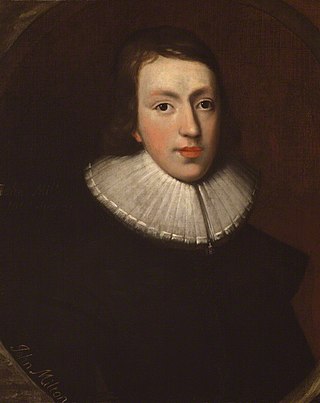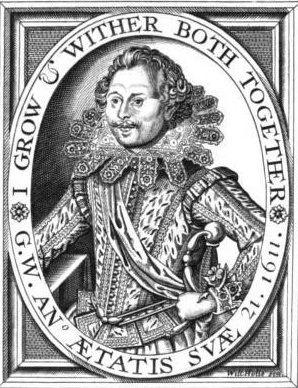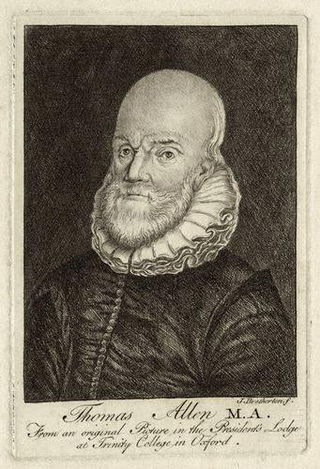Related Research Articles

George Abbot was an English divine who was Archbishop of Canterbury from 1611 to 1633. He also served as the fourth Chancellor of the University of Dublin, from 1612 to 1633.

John Milton was an English poet and intellectual. His 1667 epic poem Paradise Lost, written in blank verse and including over ten chapters, was written in a time of immense religious flux and political upheaval. It addressed the fall of man, including the temptation of Adam and Eve by the fallen angel Satan and God's expulsion of them from the Garden of Eden. Paradise Lost is widely considered one of the greatest works of literature ever written, and it elevated Milton's widely-held reputation as one of history's greatest poets. He also served as a civil servant for the Commonwealth of England under its Council of State and later under Oliver Cromwell.

Recusancy was the state of those who remained loyal to the Catholic Church and refused to attend Church of England services after the English Reformation.

Joseph Hall was an English bishop, satirist and moralist. His contemporaries knew him as a devotional writer, and a high-profile controversialist of the early 1640s. In church politics, he tended in fact to a middle way.

Robert Persons, later known as Robert Parsons, was an English Jesuit priest. He was a major figure in establishing the 16th-century "English Mission" of the Society of Jesus.
Richard Crashaw was an English poet, teacher, High Church Anglican cleric and Roman Catholic convert, who was one of the major metaphysical poets in 17th-century English literature.
Polemic is contentious rhetoric intended to support a specific position by forthright claims and to undermine the opposing position. The practice of such argumentation is called polemics, which are seen in arguments on controversial topics. A person who writes polemics, or speaks polemically, is called a polemicist. The word derives from Ancient Greek πολεμικός (polemikos) 'warlike, hostile', from πόλεμος (polemos) 'war'.

George Wither was a prolific English poet, pamphleteer, satirist and writer of hymns. Wither's long life spanned one of the most tumultuous periods in the history of England, during the reigns of Elizabeth I, James I, and Charles I, the Civil War, the Parliamentary period and the Restoration period.

Henry William Wilberforce, was a Church of England clergyman, a Tractarian, a convert to the Roman Catholic Church, and thereafter a newspaper proprietor, editor and journalist

Thomas Allen (or Alleyn) (21 December 1542 – 30 September 1632) was an English mathematician and astrologer. Highly reputed in his lifetime, he published little, but was an active private teacher of mathematics. He was also well connected in the English intellectual networks of the period.
Henry Nevill, de facto 9th Baron Bergavenny was an English iron founder, soldier and politician who sat in the House of Commons at various times between 1601 and 1622 when he inherited the Baron Bergavenny peerage.
The Archpriest Controversy was the debate which followed the appointment of an archpriest by Pope Clement VIII to oversee the efforts of the Roman Catholic Church's missionary priests in England at the end of the sixteenth century.
Events from the year 1680 in England.
Luke Milbourne or Milbourn (1649–1720) was an English clergyman, known as a High Church supporter of Henry Sacheverell, and also as a critic and poet.
William Bavand was an English lawyer and translator. He is chiefly remembered as the translator of Johannes Ferrarius’s The Good Ordering of a Commonweal (1559).
The Great Tew Circle was a group of clerics and literary figures who gathered in the 1630s at the manor house of Great Tew, Oxfordshire in southern England, and in London.
Abraham Holland was an English poet. He was the son of the translator, Philemon Holland, and the brother of the printer, Henry Holland. His best known work is the Naumachia, a poem on the Battle of Lepanto in 1571.

The Secrets of Angling was a book written by John Dennys. It was the earliest English poetical treatise on fishing, first published in 1613 in London. A didactic pastoral poem in 3 books, in the style of Virgil's Georgics. It was published in 4 editions until 1652, examples of which are amongst the rarest books in existence.
Thomas Moundeford M.D. (1550–1630) was an English academic and physician, President of the London College of Physicians for three periods.
John Gee (c.1596–1639) was an English Church of England cleric. A survivor of the Fatal Vespers disaster, at a time when he was involved in clandestine Roman Catholic religious activity, he then became a writer against Catholics.
References
- ↑ British Library Integrated Catalogue under "Robert Carliell". ; Oxford Companion to English Literature . 4th e., ed. Sir Paul Harvey, rev. Dorothy Eagle. (Oxford: OUP, [1967] 1984).
- ↑ Page 9, quoted in ODNB entry by Sidney Lee, rev. Reavley Gair. Retrieved 27 May 2017. Pay-walled.
- ↑ ODNB entry.